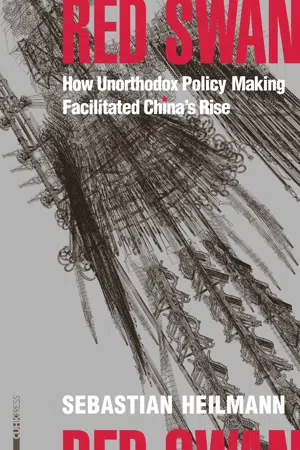
- English
- PDF
- Available on iOS & Android
About this book
China stands as a major "Red Swan" challenge to the social sciences. The resilience of the Communist party-state, in combination with a rapidly expanding and internationally competitive economy, challenges conventional models of economic development and political change. This book focuses on crucial governmental action programs and examines the manner in which they were developed, formulated, implemented, adjusted, and revised. It finds that Chinese policy making has been driven by a distinctive political methodology—an unusual combination of long-term national agendas with versatile local policy experimentation—that serves as an effective mechanism for policy innovation and correction, and thus provides strong adaptive capabilities in a perpetually shifting economic, technological and international context.~~~~~~~~~~~~~~~An original and persuasive book by one of the leading scholars of China's policy-making process. The paradox of China's successful market reforms is that they were achieved by a combination of top-down direction and decentralized experimentation that originated with Mao Zedong. Heilmann develops his argument over the course of contemporary Chinese history with great skill and grace.—Susan Shirk, Research Professor and Chair21st Century China Center, The University of California, San DiegoThis is an excellent study that helps us all better understand why a tightly controlled authoritarian system has been so successful.—Ezra F. Vogel, Henry Ford II Professor of the Social Sciences EmeritusHarvard UniversityHeilmann's work brings to light the distinctive processes of policy making in China that are not widely known and often misunderstood.—Shaoguang Wang, ProfessorSchool of Public Policy and Management, Schwarzman Scholars, Tsinghua UniversityGoing beyond traditional Western theories of institutionalism, this book provides a detailed analysis of how unorthodox policy making contributed to China's economic rise. It shows how, rooted in the Chinese Communist revolution, China's public policy process gradually evolved into various types of experiments and innovations, and facilitated a comprehensive framework for adaptive governance. Heilmann opens a new window to understand China's unique developmental experience.—Lan Xue, Professor and DeanSchool of Public Policy and Management, Tsinghua University
Frequently asked questions
- Essential is ideal for learners and professionals who enjoy exploring a wide range of subjects. Access the Essential Library with 800,000+ trusted titles and best-sellers across business, personal growth, and the humanities. Includes unlimited reading time and Standard Read Aloud voice.
- Complete: Perfect for advanced learners and researchers needing full, unrestricted access. Unlock 1.4M+ books across hundreds of subjects, including academic and specialized titles. The Complete Plan also includes advanced features like Premium Read Aloud and Research Assistant.
Please note we cannot support devices running on iOS 13 and Android 7 or earlier. Learn more about using the app.
Information
Table of contents
- Half Title
- Title Page
- Copyright Page
- Contents
- Introduction
- 1 China’s Adaptive Governance as a “Red Swan” in Comparative Politics
- 2 From Local Experiments to National Policy:The Origins of China’s Distinctive Policy Process
- 3 Policy Experimentation and Institutional Innovation in China’s Economic Transformation
- 4 How to Combine Policy Experiments with Long-Term Priorities: Unorthodox Lessons from China
- 5 Making Plans for Markets: Policy for the Long Term in China
- 6 The Reinvention of Development Planning in China
- Epilogue Changes in China’s Policy Processunder General Secretary Xi Jinping
- NOTES
- ABBREVIATIONS
- GLOSSARY
- INDEX